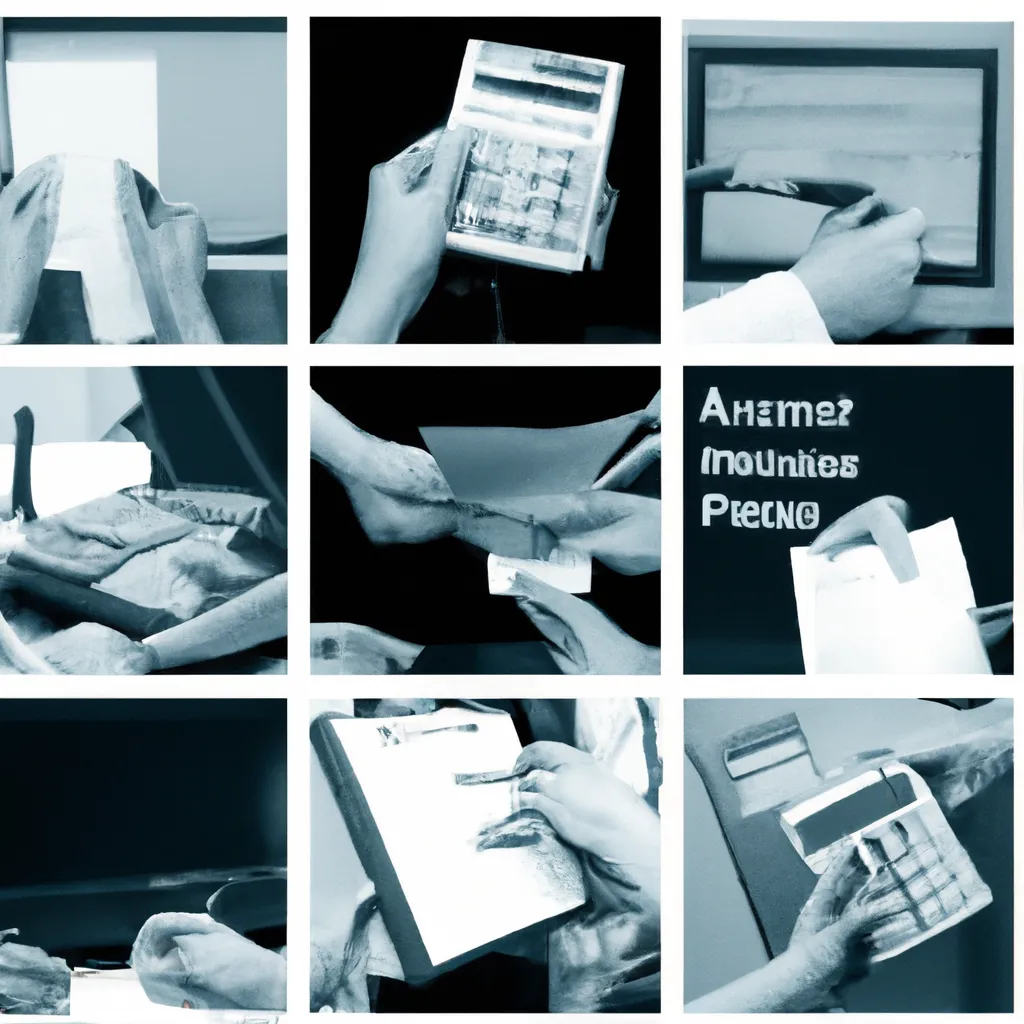Maximize Profits with Toronto Accrual Basis Asset Management Are you looking for ways to maximize your profits in Toronto. Look no further than Accrual Basis Asset Management – the key to unlocking your business's full potential. With Accrual Basis Asset Management, you can accurately track and manage your company's assets, ensuring that all expenses and revenues are accounted for. This streamlined approach allows you to make informed decisions about your assets, ultimately leading to increased profits.
Imagine being able to identify the most profitable assets in your business, while at the same time pinpointing areas where you may be losing money. This is possible with Toronto Accrual Basis Asset Management. By keeping track of your assets' performance, you can make strategic moves to maximize your profits and minimize any potential losses. Toronto Accrual Basis Asset Management has been trusted by some of the most successful businesses in the world.
From small startups to large corporations, companies have seen a significant increase in profits by implementing this asset management system. Take control of your assets and take your profits to the next level with the help of Toronto Accrual Basis Asset Management. Don't wait any longer – start maximizing your profits today with Toronto Accrual Basis Asset Management. With this proven system, you can tap into the expertise of professionals and revolutionize the way you manage your assets.
Say goodbye to guesswork and hello to a more profitable future. So, are you ready to take your business to the next level.

Understanding accrual basis asset management
In the world of accounting, there are two main methods of bookkeeping: cash basis and accrual basis. While the cash basis method may be more commonly known, the accrual basis method is widely used in toronto, especially by businesses with higher revenue and more complex financial structures. In this article, we will delve into the details of accrual basis asset management and why it may be beneficial for your business.
What it is and how it works
Accrual basis accounting recognizes revenues and expenses when they are earned or incurred, rather than when cash changes hands. This means that revenue is recorded when a product or service is delivered to a customer, even if payment is not received right away. Conversely, expenses are recorded when they are incurred, regardless of when they are paid. This method provides a more accurate and comprehensive view of a company's financial health, as it reflects the current state of accounts receivable and payable.
Under accrual basis accounting, the accounting period typically coincides with a company's fiscal year, which can be different from the calendar year. This allows for better management of cash flows and more accurate financial reporting, as certain expenses and revenue may fluctuate throughout the year.
One of the key components of accrual basis asset management is the tracking of accounts receivable, which is the money owed to a company by its customers for goods or services provided. This is different from cash basis accounting, where revenue is only recorded when cash is received. With accrual basis, a business is able to see a more accurate picture of their current assets, as they can track money that is owed to them but not yet received.
Benefits of accrual basis for your business
Accrual basis accounting offers several advantages for businesses, particularly those with a higher volume of transactions or larger revenues. By providing a more accurate and current view of a company's financial health, it allows for better decision-making and planning for the future.
One of the main benefits of accrual basis is its ability to provide a more accurate measure of a company's profitability. With cash basis, revenue and expenses are only recorded when cash is exchanged, which can be misleading in terms of a company's performance. By recording revenue and expenses when they are earned or incurred, accrual basis provides a clearer picture of a company's financial success.
In addition, accrual basis allows for better tracking of unpaid expenses and accounts receivable, which can be crucial for managing cash flow. For businesses with larger transactions or a high volume of clients, this can be especially helpful in maintaining a healthy financial position.
Lastly, accrual basis accounting is generally accepted by reporting standards such as generally accepted accounting principles (gaap) and international financial reporting standards (ifrs). This means that it is a recognized and reliable method of accounting, providing credibility and legitimacy to a company's financial statements.
How it differs from cash basis accounting
As previously mentioned, the main difference between accrual basis and cash basis accounting is the timing of when revenues and expenses are recognized. While accrual basis recognizes them when they are earned or incurred, cash basis only records them when cash is exchanged. This can result in discrepancies between a company's financial statements and its actual financial health.
For smaller businesses with fewer transactions, cash basis may be a simpler and more practical option. However, as a company grows and its financial structure becomes more complex, accrual basis becomes a more advantageous and accurate method of accounting.
Understanding accrual basis asset management is crucial for businesses looking to accurately measure their financial health and make strategic decisions for the future. With its ability to provide a more current and comprehensive view of a company's finances, it is a widely used and accepted method of accounting that can greatly benefit businesses of all sizes.

Streamlining your accounts receivable
If you are a business owner in toronto, you know how important it is to maintain a healthy cash flow for your business. One of the key elements in achieving this is efficient management of your accounts receivable. Accounts receivable refers to the money that is owed to your business by your customers for goods or services that have been delivered but not yet paid for. In simpler terms, it is the money that your customers owe you.
Keeping track of your accounts receivable is crucial for the financial well-being of your business. Not staying on top of your receivables can lead to cash flow issues, which can hinder your business operations and growth. Without proper management, your accounts receivable can quickly become a burden, causing you to spend more time chasing payments than running your business.
Importance of keeping track of your accounts receivable
One of the main reasons why you should closely monitor your accounts receivable is to ensure that your customers are paying on time. Late or missed payments can significantly impact your cash flow, making it difficult for you to cover your expenses and meet your financial obligations. Additionally, delayed payments can also result in strain on your relationship with your customers, leading to potential business loss.
Maintaining a record of your accounts receivable also helps you keep track of your sales and monitor the performance of your business. It gives you a clear picture of your current and expected cash flow, allowing you to make informed decisions for the future.
Tips for efficient invoicing and collections
Effective invoicing is key to accelerating your cash flow and managing your accounts receivable. Here are some tips to streamline your invoicing process and improve collections:
- make your invoicing process clear and easy to understand: Your invoices should clearly outline the products or services provided, the due date for payment, and acceptable methods of payment. Providing this information upfront can help avoid confusion and delays in payments.
- send invoices immediately: The faster you send out your invoices, the sooner you will receive payment. Make sure to follow up a few days after the due date if a payment has not been made.
- offer incentives for early payment: Consider offering discounts for clients who pay their invoices early. This can motivate them to pay on time and improve your cash flow.
- establish clear payment terms: Clearly define your payment terms, such as the number of days your clients have to make a payment. This will eliminate any misunderstandings and ensure timely payments.
In addition to efficient invoicing, it is also crucial to have a proper collections process in place. Here are some tips to streamline your collections and maintain a healthy cash flow:
- regularly communicate with customers: Keep an open line of communication with your customers and remind them of upcoming due dates or late payments. This can help prevent delayed payments and improve customer relationships.
- offer payment options: Provide multiple payment options, such as credit card, electronic transfer, or cheque, to make it easier for your customers to pay.
- consider using a collections agency: If you have exhausted all other options, consider hiring a collections agency to help you collect payments from difficult customers.
Using accrual basis to manage your accounts receivable
One effective method for managing your accounts receivable is using accrual basis accounting. Accrual basis accounting records revenue and expenses when they are earned, rather than when money actually exchanges hands. This means that even if you haven't received payment yet, you can still record the sale and recognize it as revenue.
Using the accrual basis method can help you better manage your accounts receivable for a few reasons:
- revenue recognition: The revenue from a sale is recorded when the sale is made, regardless of when payment is received. This gives you a more accurate picture of your sales and financial performance.
- matching principle: The expenses related to a sale are recorded when the sale is made, providing a more accurate representation of the cost to generate that sale.
- predictive analysis: Using accrual basis allows you to project future sales and cash flow based on your current accounts receivable and other financial data.
Efficiently managing your accounts receivable is crucial for maintaining a healthy cash flow and ensuring the success of your business. By following these tips and utilizing the accrual basis method, you can streamline your invoicing and collections process, improve your cash flow, and make informed decisions for the future of your business.

Managing your accounting period
Welcome to the world of financial management, where every decision, no matter how small, has an impact on your bottom line. One crucial factor that often gets overlooked is the accounting period. This seemingly mundane aspect of business operations can actually play a significant role in the success of your organization. In this article, we will discuss why your accounting period matters and how you can effectively manage it using the accrual basis method in toronto.
Why your accounting period matters
The accounting period refers to the specific time frame in which you record your financial transactions. Typically, businesses have an annual accounting period, but some may also choose to have quarterly, biannual, or even monthly periods. The length of your accounting period can have a direct impact on the accuracy and reliability of your financial records.
One of the main reasons why your accounting period matters is that it allows for better financial planning and decision-making. By having a designated timeframe for financial reporting, you can track your company's performance and identify potential issues or opportunities. This information can then be used to make strategic decisions and set realistic goals for the future.
Moreover, adhering to a consistent accounting period can also help with tax compliance and audit preparations. With neatly organized financial records, you can save time and reduce the risk of errors during tax season. This can also help you avoid any penalties or fines due to incorrect reporting.
Using accrual basis to stay on top of your finances
Now that you understand the importance of your accounting period let's discuss how you can effectively manage it. One method that is widely used by businesses, especially in toronto, is the accrual basis of accounting.
The accrual basis method recognizes revenue when it is earned, regardless of when the payment is received, and records expenses when they are incurred, regardless of when the payment is made. This allows for a more accurate representation of your company's financial position and performance. For instance, if you provide a service in one month but do not receive payment until the following month, the accrual basis method would record the revenue in the month the service was provided, giving a more accurate depiction of your profits.
In addition, using this method also allows for better tracking of accounts receivable and accounts payable. Accounts receivable is the money owed to your business by customers, and accounts payable is the money your business owes to suppliers, vendors, or other creditors. By keeping track of these accounts on an accrual basis, you can have a better understanding of your company's cash flow and make informed decisions about managing your finances.
Strategies for managing your accounting period
While the accrual basis method can be helpful in managing your accounting period, there are also some additional strategies you can implement to ensure smooth financial operations.
1. Set a consistent period: as mentioned earlier, having a designated timeframe for your accounting period is crucial. Stick to this time frame consistently to avoid any confusion or discrepancies in your financial records.
2. Keep accurate records: ensure that all financial transactions are recorded accurately and in a timely manner. This will help avoid any errors or discrepancies in your reports.
3. Monitor your cash flow: regularly track your accounts receivable and accounts payable to have a better understanding of your cash flow. This will help you anticipate any potential cash shortages or surpluses and make necessary adjustments.
4. Utilize accounting software: investing in sophisticated accounting software can make a significant difference in efficiently managing your accounting period. These tools can help streamline your financial reporting and make it easier to keep track of your business's finances.
By implementing these strategies and using the accrual basis method, you can effectively manage your accounting period and make informed decisions for your business's financial success.
Your accounting period may seem like a small detail, but it can have a significant impact on your business's financial management and success. By understanding its importance and implementing the right strategies, you can ensure accurate financial reporting and make informed decisions that will contribute to your company's growth. So, make sure to give your accounting period the attention it deserves and take advantage of the accrual basis method in toronto.
Minimizing inheritance tax with accrual basis
The thought of inheritance tax can be intimidating for many individuals, especially when thinking about passing down wealth and assets to the next generation. Inheritance tax is a tax imposed on the transfer of assets from a deceased person to their beneficiaries. In toronto, the inheritance tax rate can be up to 40%, which can significantly impact the wealth that is left behind for loved ones.
Understanding inheritance tax and its implications
Inheritance tax is calculated based on the fair market value of the assets at the time of the deceased's passing. This includes real estate, investments, and any other assets that are part of the estate. The tax is paid by the beneficiaries, and the amount varies depending on the relationship between the deceased and the beneficiary. Spouses and immediate family members typically have a lower tax rate compared to non-related individuals.
One of the main concerns with inheritance tax is the potential for double taxation. This happens when assets are transferred from the deceased to the beneficiary and then taxed again when the beneficiary eventually passes away. This can significantly decrease the value of the assets left for future generations, making it essential to plan and minimize inheritance tax as much as possible.
How accrual basis can help you plan for inheritance tax
Many individuals use cash basis accounting, where income is recorded when it is received and expenses are recorded when they are paid. However, using an accrual basis for accounting can be beneficial for estate planning and minimizing inheritance tax. Accrual basis accounting records revenues and expenses when they are earned, regardless of when they are received or paid. This can help reduce the value of the estate and ultimately decrease the amount of inheritance tax that is owed.
When using accrual basis accounting, accounts receivable are counted as income during the accounting period, even if the income has not been received. This reduces the overall value of the estate, which means lower inheritance tax. It is essential to carefully track these accounts receivable and pay close attention to the timing of income recognition to ensure that it falls within the appropriate accounting period.
Strategies for maximizing profits and minimizing tax
In addition to using accrual basis accounting, there are other strategies that can be implemented to maximize profits and minimize inheritance tax. One approach is to gift assets to beneficiaries during the deceased's lifetime. This can reduce the overall value of the estate and lower the potential tax liability. However, it is crucial to consider any gift tax implications and to seek professional advice to ensure this is a feasible option for your specific situation.
Another strategy to reduce inheritance tax is to establish a trust. Trusts can be used to hold and manage assets, and when structured correctly, can help minimize inheritance tax. This is because the assets in the trust are not considered part of the estate and therefore not subject to inheritance tax. Again, it is essential to seek professional advice to ensure a trust is the right option for your circumstances and to properly structure it for maximum tax benefits.
Lastly, it is crucial to regularly review and update your estate planning strategy. Tax laws and regulations can change, and it is essential to stay up-to-date to ensure that your plan is still effective in minimizing inheritance tax. Seeking professional advice from an accountant or an estate planning lawyer can help ensure your strategy is optimized and tailored to your needs.
In summary, minimizing inheritance tax is crucial for those looking to pass down assets to future generations. Using accrual basis accounting, considering gifting and trust strategies, and regularly reviewing and updating your plan, are all effective ways to reduce tax liabilities and maximize profits. It is always best to seek professional advice and carefully plan your estate to ensure your wishes are carried out in the most tax-efficient manner. By utilizing these strategies, you can minimize the impact of inheritance tax and leave a lasting legacy for your loved ones.
Efficiently managing your accounts payable
Accounts payable are an essential aspect of any business's financial management. The accounts payable department is responsible for the payment of goods and services that a company has received from its suppliers or vendors. Efficiently managing your accounts payable is crucial for maintaining good relationships with suppliers, controlling cash flow, and ensuring timely payments. In this article, we will discuss the importance of tracking your accounts payable, using accrual basis for effective payment management, and provide tips for streamlining your accounts payable process in toronto, a city known for its bustling and competitive business environment.
The importance of tracking your accounts payable
Tracking your accounts payable is necessary for keeping accurate financial records and maintaining a healthy cash flow. By tracking your accounts payable, you have a record of all the payments that your company owes to suppliers or vendors, which allows you to forecast your future expenses and plan your budget accordingly. It also helps you identify any discrepancies or errors in your records, ensuring that payments are made correctly and on time.
Moreover, tracking your accounts payable is essential for building and maintaining good relationships with suppliers. By staying on top of your payment obligations, you demonstrate your reliability and professionalism, which can lead to better terms and improved credit lines with your suppliers. In contrast, consistently making late payments can damage your reputation and lead to strained relationships with suppliers.
Using accrual basis for effective payment management
The accrual basis of accounting recognizes revenue and expenses when they are incurred, rather than when they are received or paid. This approach is especially useful for managing accounts payable as it provides a more accurate indication of your company's current financial position. Since bills are recorded when the expense is incurred, you have a more comprehensive overview of your company's liabilities, making it easier to forecast and manage cash flow.
Additionally, using the accrual basis of accounting helps you better allocate expenses to the appropriate accounting period, which is especially important if you have long payment terms with your suppliers. By accurately recording expenses, you can avoid overstating or understating your financial performance, providing stakeholders with a more accurate representation of your company's health and future prospects.
Tips for streamlining your accounts payable process
Streamlining your accounts payable process can save your business time and money while also reducing the risk of errors and delays. Here are some tips for improving the efficiency of your accounts payable process:
- implement an electronic system: Manually processing invoices can be time-consuming and prone to errors. Implementing an electronic system for managing accounts payable can eliminate paper-based processes and automate tasks such as invoice entry and approval, reducing the chance of errors and delays.
- negotiate payment terms: Negotiating longer payment terms with suppliers can help your business better manage its cash flow. However, it is essential to find a balance between using longer payment terms as a tool for managing cash flow and ensuring supplier needs are met.
- use purchase orders: Using purchase orders can streamline the accounts payable process by providing a structured and organized system for requesting and receiving goods and services. They help to minimize the risk of duplicate or incorrect invoices as well.
- regularly review and reconcile accounts: It is crucial to regularly review and reconcile your accounts payable to identify any discrepancies or errors. This will help you stay on top of outstanding payments and avoid any late fees or penalties.
- centralize invoice processing and approvals: By centralizing invoice processing and approvals, you can create a more streamlined and efficient process. Having a designated person or team responsible for managing accounts payable can also improve accountability and reduce the risk of errors or delays.
Efficiently managing your accounts payable is crucial for maintaining good relationships with suppliers, controlling cash flow, and ensuring timely payments. By tracking your accounts payable, using accrual basis for effective payment management, and streamlining your accounts payable process, you can improve your business's financial management and maintain a competitive edge in toronto's business landscape.

